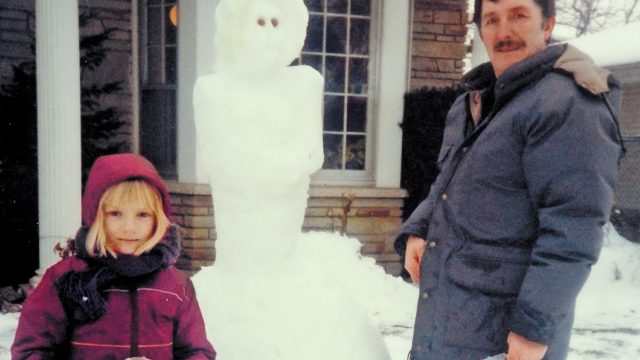I saw Stories We Tell and Take This Waltz in the opposite order as viewers who saw the two films in theaters. Take This Waltz was released in 2011 while Stories We Tell was released in 2012. Perhaps that helped me to see the two movies as one grand sweeping gesture. Seeing the documentary first gives the viewer the baseline of “real” information with which to appreciate the beauty of the second fictionalized version.
I also saw Stories We Tell with my co-dependent mom who has suffered through many of my dad’s affairs with paramours ranging from prostitutes to family friends. She knew Stories We Tell was about infidelity and she was skeptical she would be interested. The truth is that our family history would probably make a pretty interesting documentary itself, but she had the opposite interpretation. “This kind of stuff happens to everybody! Boring!” she said.
In Stories We Tell, the gender dynamic is flipped from the one my mom experienced; the one we’re used to hearing about infidelity and child rearing. It’s Sarah’s mother, Diane, who is unfaithful to Michael Polley, the main who raised Sarah after Diane runs off to a new life with another man. In digging into her mother’s past, Sarah finds out that her biological father is not Michael, but a producer who was having an affair with Diane, Harry Gulkin.
Stories We Tell plays with the viewer’s conceptions of what’s real and what’s fictionalized. Take This Waltz tells a very similar story to the one we now know is Sarah Polley’s family history with well-known actors like Michelle Williams and Seth Rogen, but Stories We Tell casts Rebecca Jenkins to play a young version of Sarah’s mother, Diane Polley in recreations that Polley has doctored to look like very old footage, which Polley reveals masterfully as Stories We Tell comes to a close.
When I watched Take This Waltz a few years later, I was immediately struck by all the similarities between Seth Rogen’s character, Lou, and Michael as well as Michelle Williams’ character, Margo, and Diane, in terms of both their looks and their personalities. But Polley made her fictionalized portrayal of her parent’s story neater than what happened to her family in real life by erasing her own presence.
There’s a heartbreaking scene at the end of Take This Waltz in which Michelle Williams tries to see if the damage she inflicted on her relationship with Rogen by leaving him can be undone. She can’t quite verbalize that question, but Rogen knows what she’s asking and tells her it can’t. He draws a boundary that Michael Polley could never have drawn with Diane because there was a child in the picture.
That child grew up to write the man who raised her a version of the story that gave him more dignity because he was able to draw better boundaries. Stories We Tell and Take This Waltz taken together as a whole showed me a new thing that filmmaking could accomplish, sort of like a real life version of what Briony did in Atonement. And that’s just so goddamn beautiful, I could cry.

